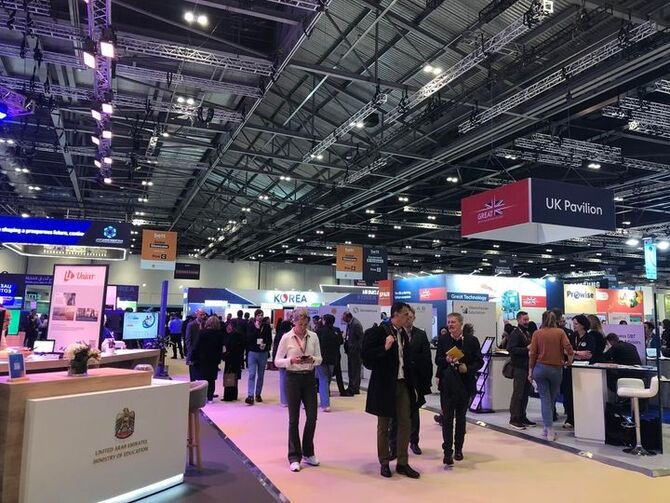New transatlantic partnership aims to put children’s voices at the heart of AI development to address impact and risks
The NSPCC and Common Sense Media, will launch a new transatlantic partnership at Bett UK on 25 January 2024.

- NSPCC and Common Sense Media join forces with three-pronged approach to keep children safe and foster healthy experiences in emerging technology
- CEOs will announce partnership on the BETT UK Conference main stage, as well as at next week’s The Common Sense Summit on Kids and Families in San Francisco
- Alliance comes as Childline reveals young people are reaching out for support about AI risks such as bullying and sexual abuse, and builds on Common Sense Media’s new AI ratings system
Read related articles
- Computational thinking for an AI age
- How do we flourish in the age of AI?
- The UK hosts the first global AI Safety Summit
The three-pronged partnership will advocate for children, ensuring their experiences and safety are central to decision making by tech companies and regulators, as well as front of mind for policymakers on both sides of the Atlantic and globally.The organisations will also roll out education programmes to increase digital literacy skills in schools and share a joint approach to research in order to improve global understanding of the impact of generative AI on children.This alliance comes as the NSPCC-run Childline reveals young people are contacting the service about AI child sexual abuse material and other harms linked to generative AI such as bullying and misinformation.One 15-year-old girl told Childline: “A stranger online has made fake nudes of me. It looks so real, it’s my face and my room in the background. They must have taken the pictures from my Instagram and edited them. I’m so scared they will send them to my parents, the pictures are really convincing, and I don’t think they’d believe me that they’re fake.”NSPCC Chief Executive Sir Peter Wanless and Common Sense Media founder and CEO James P. Steyer will discuss the global impact of AI on learning and children’s safety at the BETT EdTech conference at the Excel in East London today.They will argue that the benefits of AI cannot mean children’s safety is overlooked and launch their vision for the needs and safety of young people to be embedded in product and policy decisions in the boardroom, classroom, and legislatures.This will be followed with a joint appearance at The Common Sense Summit on America's Kids and Families in San Francisco at the end of the month, where speakers also include Secretary Hillary Clinton and Meta whistle-blower Arturo Bejar.NSPCC Chief Executive Sir Peter Wanless said: “As one of the leading voices helping to achieve the Online Safety Act in the UK, we have long acknowledged the need for global collaboration by Governments, civil society and tech firms to drive children’s safety online.“This cannot be clearer than in AI where a rush to gleam the significant benefits of technology has led to worldwide concerns about the danger it can also pose.“The risk children face from unregulated and unsafe AI is already far too high, and their safety and experiences must be at the centre of conversations about its development and regulations. This partnership will seek to do that while also empowering young people with digital literacy skills to help them thrive.”James P. Steyer, founder and CEO of Common Sense Media, hailed the new partnership. “To safely and responsibly harness the potential of AI for children, global organisations must work together to ensure that the government and private sector have children’s best interests at heart for all technology design, development, and deployment.“The NSPCC, and the UK more broadly, is seeing great progress by activating its educators, parents, and policymakers, and we look forward to amplifying their efforts in the U.S. and globally,” Steyer said.The NSPCC and Common Sense Media UK partnership will begin with a pilot to scale digital citizenship and literacy classes in schools in south Wales.The pilot will use NSPCC networks and Common Sense Media resources to help school leaders teach children invaluable lessons about navigating the constantly evolving tech landscape in which they live.In response to emerging possibilities of the digital world, we aim to deliver best-in-class, age appropriate digital and AI literacy lessons to children across the UK and respond to urgent policy challenges for children in the US, Europe, and beyond.Lord Ed Vaizey of Didcot, Chair of Common Sense Media UK, said: “With the NSPCC, Common Sense Media UK couldn’t have found a better partner to scale its mission and vision for children. Child advocacy is at the heart of everything we do. Collaborating with the UK’s leading child advocate will accelerate our common cause to keep children safe online, particularly in interacting with emerging AI technology.”
How is your company managing geopolitical change in global mobility policies and practice? Share your excellence and enter Relocate & Think Global People Awards 2024!Be inspired by our Flexibility & Choice theme for this year and perfect your winning entry by watching the Top Tips video with Head Judge, Dr Sue Shortland.
Find out more about the Think Global People community and events.
Subscribe to Relocate Extra, our monthly newsletter, to get all the latest international assignments and global mobility news.Relocate’s new Global Mobility Toolkit provides free information, practical advice and support for HR, global mobility managers and global teams operating overseas.
©2024 Re:locate magazine, published by Profile Locations, Spray Hill, Hastings Road, Lamberhurst, Kent TN3 8JB. All rights reserved. This publication (or any part thereof) may not be reproduced in any form without the prior written permission of Profile Locations. Profile Locations accepts no liability for the accuracy of the contents or any opinions expressed herein.




























